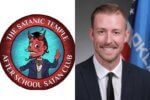Some people thought it couldn’t happen here. But in a nation mired in religious and philosophical tradition, a season of spiritual refreshing has begun.
When the staff of a small church in Mâcon, France, gathered to fast, pray and seek God one weekend in January 1994, they had no idea that their contrite efforts were going to have national consequences. They had come together mainly to right their own lives with God.
But God had more than that in mind.
“We were fasting and praying, desperate to see more of God,” says Pierre Cranga, pastor of L’Espace du Pleine Evangile (The Full Gospel Place). “As we repented, the Lord came with an anointing of holy laughter. We knew something special was happening.”
They were right, but they didn’t know that God also was about to use their experience to visit France in a new and unprecedented way.
After the retreat the L’Espace team went about business as usual while preparing for an upcoming national youth conference. They decided to keep quiet about their retreat experience during the conference. But again, God had other plans.
L’Espace team members were shocked when, after an intense time of worship during the conference, the holy laughter they had experienced rolled in like a wave. Beginning with the musicians on stage, it surged to the back of the auditorium.
“It was the first time France had seen this spontaneous joy and laughter, and the pastoral team leading the conference didn’t know what to do,” Cranga told Charisma. “Some said, ‘If you let this continue, people won’t come back.'”
But people have been returning to Mâcon ever since–seeking what has become known as the “new wine.”
“The heart of the new wine was to bring new revelation to the people of France,” Cranga says. “Through new wine, God brought reconciliation and unity among Himself, the world and ourselves.
“In the country of philosophy,” Cranga explains, “we needed something that could bring the grace of God in a subversive way.”
France’s 60 million people are steeped in the thinking of their nation’s historical philosophers, such world-renowned figures as Voltaire, Descartes and Sartre. Cranga carries a spiritual burden for his native country and says that in the France of today, God is not part of the national consciousness.
“Our country’s biggest problem is that we have taken all references of God out of our nation,” he says. “We have a generation of people who have never heard about God.”
Suicide, depression and alcoholism are serious national concerns. Statistics published by France 2001–an international prayer movement–state that 40,000 French youth attempt suicide each year, 10 percent of adults take antidepressants, and 4 million French are alcoholics.
“The people are hopeless,” Cranga says. “There is a cry in the heart of the French.”
Answering that cry are many concerned pastors, churches and mission groups who want to see God move in France. This year, more than 500 churches in the country have participated in nationwide prayer and fasting for France.
It seems fitting that the Holy Spirit’s outpouring came first to a church in Mâcon, since it is a town in France’s Burgundy region known both for its vineyards and wine as well as for its unique spiritual heritage. In the nearby village of Cluny are the ruins of the ancient Abbey of St. Peter and St. Paul, which from the 11th to the 14th centuries was the most powerful monastic foundation in Europe.
Also close by is the center of a world-famous ecumenical community–in Taizé–where thou
sands of Christians gather each year for conferences, camps and worship services.
In keeping with the local heritage, the L’Espace church welcomes Christian pilgrims to the region. Primarily through its conference ministry, L’Espace has since 1990 hosted more than 25,000 seekers–many of whom have come since the Spirit’s new wine began pouring.
It was in Mâcon that Pierre Cranga and his wife, Mylène, sought in vain for a church home after they became Christians as young adults. Instead they pored hungrily over their Bibles and traveled up to 800 kilometers for church meetings.
After two years of hosting a prayer group in their home, they started a church. Pierre accepted the role of pastor, and L’Espace quickly began to discover its destiny in worship music, conference ministry, Christian education, publishing and missions.
The church’s heart for worship resulted in the formation of a band called 777, which today is one of France’s premier contemporary worship bands. Original songs, quality music and a modern style make them a nationwide favorite, especially among youth.
After attending a conference of 12,000 believers in England, associate pastor Carlos Payan asked God, “Why not this in France?” Soon afterward, L’Espace hosted a conference for 50 people, then conferences for 300, 500 and, by 1994, 1,700 people. Since then,
registration has reached 3,250.
In 1991, a Christian school was started at L’Espace. Today its 40 students are taught to analyze subjects from a biblical perspective.
“With new French Christians, we must demolish fortresses of thinking and philosophy that have been built over the years,” Cranga says. “But in our school, we dream to build good fortresses.”
The church’s publishing arm, Editions Oberlin, also serves as the recording label for 777. All proceeds from the sale of books, including Cranga’s own four titles, and 777 recordings benefit the school.
The purpose of Editions Oberlin is to provide quality Christian literature to the French-speaking world. One of Granga’s future goals is to provide a Bible for French charismatic believers.
Although L’Espace has no
denominational affiliation, Cranga and his leadership team are united with 15 couples from 13 churches in a network of pastors and churches called Axe Rhine-Rhône. It was founded in 1990 and emphasizes relationship instead of doctrine.
Network member Samuel Rhein, pastor of Nouvelle Alliance in Belfort, says Cranga and other members encouraged him to follow his vision of founding a prophetic school.
“Pierre is a dynamic man of vision whom I believe God has chosen to influence the destiny of the church in France and abroad,” Rhein says. “He is intelligent, an excellent writer, a great thinker and a faithful man.”
Though devoted to the mutual building up of the French church, Cranga and his staff also are missions-minded. Cranga has traveled to Europe, North Africa and South America and has ministered to more than a dozen countries, including the United States.
“The Bible says that the leaves on the tree of life are for the healing of the nations,” Cranga says. “Each nation has its leaf, and we must go to give and receive healing.”
What about his own country? Does Cranga believe Mâcon’s outpouring of the new wine of the Holy Spirit was the beginning of revival in France? The country as a whole has not experienced revival, he believes.
“When we see results–conversions and new churches–these are characteristics of revival,” he says.
However, Cranga does believe that God is assembling intercessors for France and that revival will come if the church prays. Even as the French church mobilizes for prayer, forces are at work to suppress the gospel in France.
French authorities are trying to pass a law that would, in effect, make it illegal to share one’s faith. The offense would be labeled as “mental manipulation of the public.”
“The government labels all evangelicals as sects,” Cranga says. “In their efforts to find a legal tool to fight genuine sects, they could harm the church of Jesus Christ.”
But don’t doubt the staying power and resilience of the French church. As L’Espace’s associate pastor, Carlos Payan, says: “The world needs to know that the French church, though small, is alive and well. We encourage the French to rise up and meet their revival–and we send out a call to the world to pray for France.” *
Jeff Slaughter, a free-lance writer and artist, serves as a missionary with Creative Arts Europe based in Brussels, Belgium.







Leave a Comment
You must be logged in to post a comment.